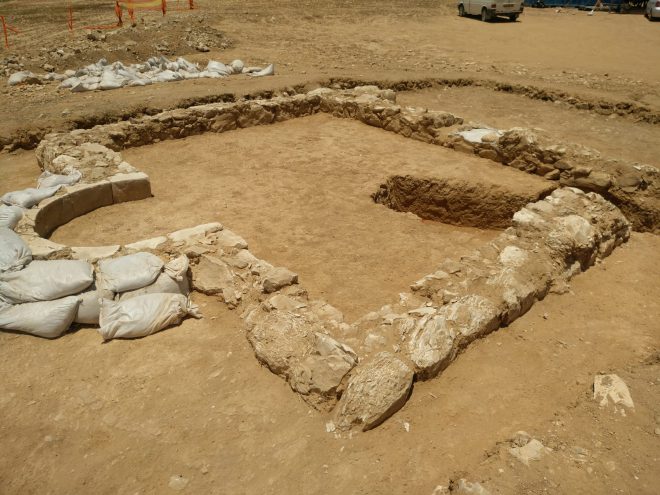The rocky brown soil of the Negev desert suggests an empty environment, but recent excavations by the Israel Antiquities Authority have brought to light an ancient mosque from the 7th-8th centuries CE there. It’s one of the earliest known mosques in the world, a surprising find in the area.
Dr. Jon Seligman and Shahar Zur, directors of the excavations for the Israel Antiquities Authority, say,
“A small rural mosque, dated to the 7th to 8th centuries C.E., is a rare finding anywhere in the world, especially in the area north of Be’er Sheva, where no similar building has previously been discovered. We know of large mosques in Jerusalem and Mecca from this period, but we have evidence of an ancient house of prayer here, which apparently served the farmers who lived in the area.
“We found remains of an open-air mosque – a rectangular building with a “Mihrab” – a prayer niche – facing south, towards Mecca. These features are evidence of the purpose for which this building was used, many hundred years ago”.
Also discovered are the remains of a a farm from the end of the Byzantine period (6th – 7th Century C.E.), and a small settlement from the beginning of the Islamic period (7th – 8th Century B.C.). There are stone buildings divided into living and storage spaces, open courtyards, kitchens and places for tabuns (outdoor ovens). According to the directors of the excavations,
“These sites were part of the agricultural structure in the Northern Negev in ancient times.” They estimate that the then-fertile soil and accessible water streams attracted potential farmers to the area.
According to Prof. Gideon Avni, an Israel Antiquities Authority expert on this period,
“This is one of the earliest mosques known from the beginning of the arrival of Islam in Israel, after the Arab conquest of 636 C.E. The discovery of a mosque near an agricultural settlement between Be’er Sheva and Ashkelon also indicates the processes of cultural and religious change which the country underwent during the transition from the Byzantine to the early Islamic period.
“The discovery of the village and the mosque in its vicinity are a significant contribution to the study of the history of the country during this turbulent period.
“According to historical Islamic sources, the new Islamic regime distributed plots of land to its senior officials, including Amr ibn al-‘As, an Arab military commander who conquered Israel and Syria. The continuation of excavations on the site will perhaps provide answers to the questions regarding the foundation of the settlement and the nearby mosque, and its connection to the Arab conquerors of Israel.”
Ground preparation for constructing a new neighborhood in the Beduin town of Rahat uncovered the ancient remains. The Authority for Development and Settlement of the Bedouins in the Negev and the Israel Antiquities Authority are now examining possible ways in which this special finding can be integrated into the neighborhood .
The excavation is a joint project of the Israel Antiquities Authority with Bedouin residents and youth groups. It’s part of the Legacy Project led by the Antiquities Authority in recent years, a project organizing youth groups to help with the excavations during the summer vacation. The kids earn a fair wage, get into touch with the past, and gain experiences that will last a lifetime. The project is financed by the Authority for Development and Settlement of the Bedouins in the Negev, and the Emek Ayalon Infrastructure & Projects Management Ltd (2000).
Photos by Anat Rasiuk/Israel Antiquities Authority.



